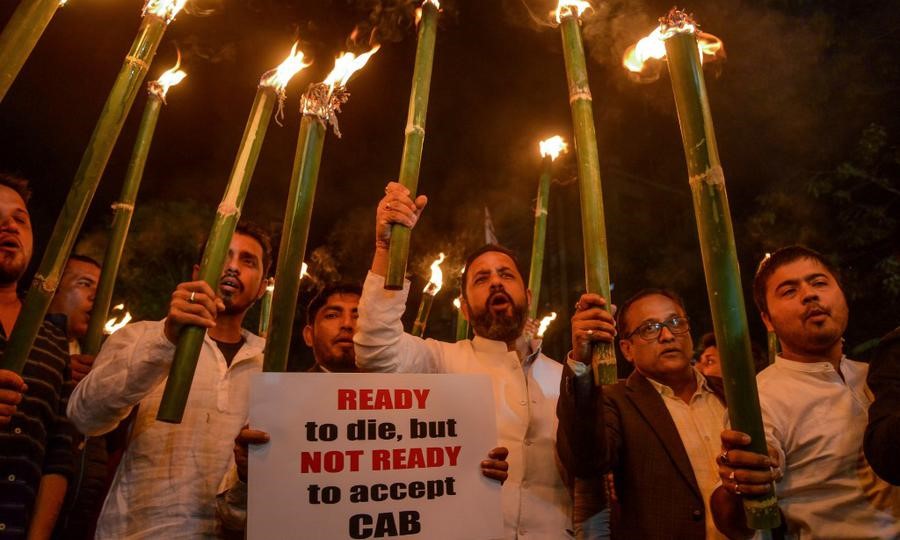
The show of strength during the 1963 “Million Man March” on Washington DC in the United States has been seen as a landmark in the Civil Rights struggle. Though it had its own problems, especially, and ironically, problems of representations since several voices were shut out, it nevertheless demonstrated a unified show of resistance, conviction and dedication for the cause of Civil Rights. It was also held in the heart of the capital of the United States so it was a poke in the eye for the government in Washington. It brought together several African-American civil society groups and thus managed a show of solidarity across different struggles within the community. (Of course, it is also known for Martin Luther King’s I have a Dream speech…)
India has witnessed several egregious instances of the suppression civil society rights in this very year, notable among them being the scrapping of Article 370 followed by the brutal clampdown in Kashmir; the National Register of Citizens (NRC) exercise in Assam and the specter of its implementation throughout India; and, the Ayodhya judgement which self-righteously pulled the carpet from under the Muslim parties and handed the entire Babri site to the Hindu side.
In addition, one has also been witnessing an alarming decline in the economic health of the country with almost all major indicators of economic performance – especially rural incomes – dipping. This is exacerbated by a government that seems clueless about how to deal with this issue which affects the lives of millions of Indians. There has also been the concern with the deteriorating safety of women especially as several men associated with the ruling party have been implicated in sexual abuse.
If all the above violations of democratic rights of the people of India were not enough, the most recent Citizenship Amendment Bill (CAB) marks another low in the treatment of Muslims in India. There cannot be any defence for a bill so exclusionary in its conception.
Yet, given there is so much that is straight-up oppressive, discriminatory, and in violation of basic rights of people, there have been few mass protests. Of course, there have been protest gatherings for specific issues, there have been isolated and localized demonstrations, and it seems several parts of the country are rising up against the just-passed CAB.
In a time when different parts of the world are coming out with great bravery and creativity in protest against oppressive regimes and unjust acts – in Algeria, Iraq, Lebanon, Chile, Hong Kong, Bolivia – India has been relatively tame, almost somnolent in terms of its outrage. Its various “constituencies” which could make common cause for mass protests and a show of disapproval of the state of affairs in the country – the worker unions, student bodies, the human and civil rights groups, the farmers’ groups – have been largely uncoordinated. There are few mass protests that could upset the status quo, the comfortable feeling of business-as-usual. Very recently, the Black Lives Matter protests in the US have also made it their aim to disrupt the “business as usual” attitude and force a reckoning of the critical issues facing the oppressed black community [1].
The country has not come together to express its abhorrence for the way Article 370 was done away in Kashmir and the freedom of the Kashmiris trampled, nor has it pushed back on the idea of a nation-wide NRC. The sinking economy has also not been able to rouse India’s progressive groups into some sort of concerted action.
With the situation as dire as in the present time and with a government machinery that seems hellbent on relentlessly moving ahead based on brute majority to implement its agenda of Hindutva, it is time to shake the idea of business as usual, time for a major march in the capital New Delhi and protest events throughout the country. It is time to register loud and clear our disapproval, dissatisfaction and complete rejection of the exclusionary and discriminatory practices that the current regime seems resolved to put in place.
If not, we all will be seeing the realization of the horrible consequences of silence that Martin Neimoller envisioned several decades ago:
First they came for the socialists, and I did not speak out—
Because I was not a socialist.
Then they came for the trade unionists, and I did not speak out—
Because I was not a trade unionist.
…
Then they came for me — and there was no one left to speak for me.
[1] https://truthout.org/articles/black-lives-matter-interrupts-business-as-usual/
Ananda Maitreya is a writer and student of social movements. He has been involved in various struggles of the marginalized people, including Dalit and Adivasi movements and the Palestinian struggle.
SIGN UP FOR COUNTERCURRENTS DAILY NEWS LETTER










































